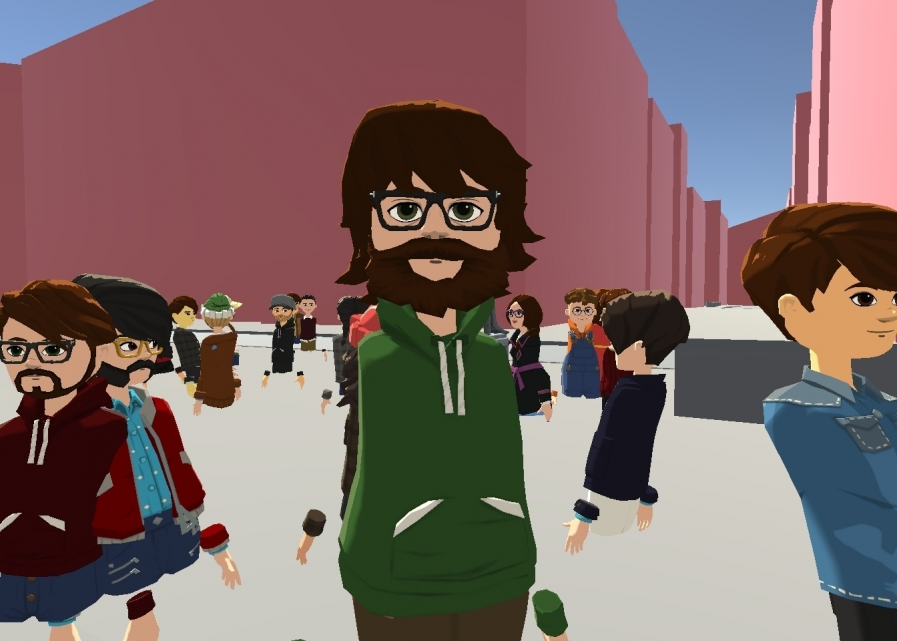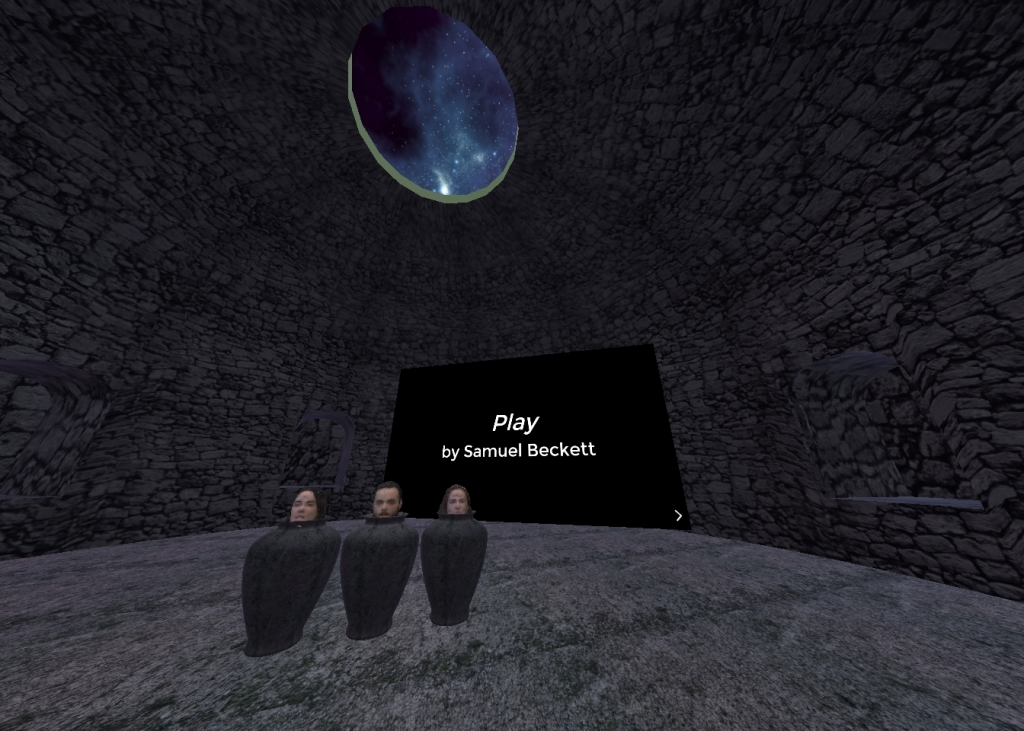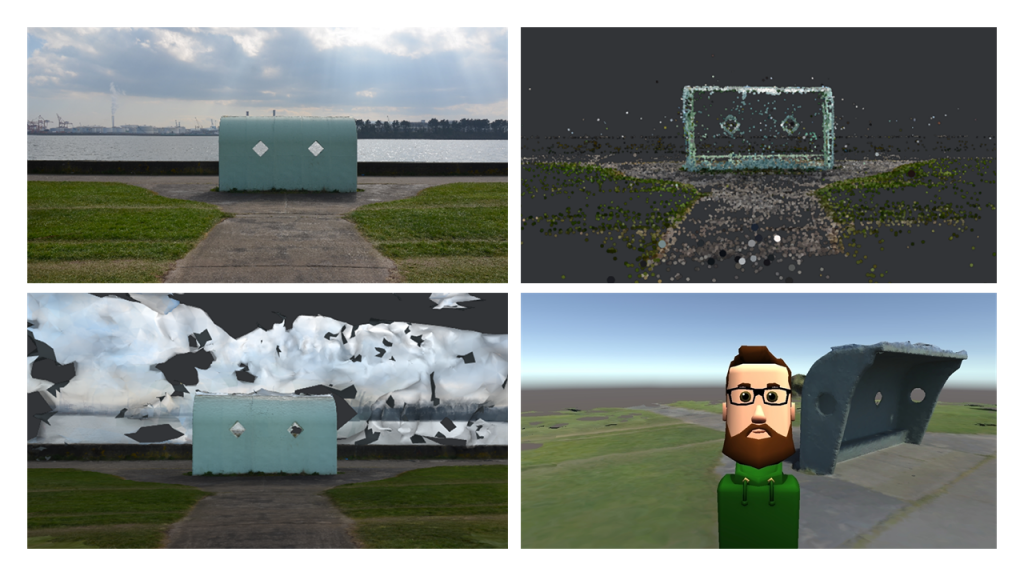Immersive Learning in Higher Education
22nd June 2020
This research extends and builds upon V-SENSE’s previous 6DoF work by exploring immersive learning practices and demonstrating workflows that enable the creation of immersive, virtual learning environments (VLEs) for social software platforms. The goal of this research is to explore the role of embodiment, immersion, and presence in remote learning contexts and to introduce practical solutions for the collection of place-based multimedia and 3D information that can be used in the co-creation of immersive virtual environments (IVEs). The concepts of social-constructivism, ground truthing, space and place, and the virtual field trip are used to convey the different teaching and learning potentials offered through separate activities of constructing, exploring, and learning in virtual environments based on virtual classrooms and real-world locations. This practical approach actively involves members of the public, students, and teachers alike in stimulating, hands-on activities with content and take-away materials that offer relevance and meaningful rewards for engagement in remote learning and mixed reality contexts.

Exploring Virtual Reality in the Higher Education Classroom
Increasingly, online virtual worlds are becoming meeting places for students and teachers to engage, discuss, and collaborate on a diverse range of academic subjects and practices. Furthermore, in response to the recent COVID-19 global pandemic, there has also been a heightened drive to provide online educational facilities that harness IVEs via social software. Contemporary VR platforms present higher education establishments with innovative and alternative modalities for engaging with students and teaching in general. Moreover, VR facilitates telepresence and immersion, allowing the user to remotely see, hear, and potentially feel the virtual classroom experience. However, moving traditional teaching materials online is a difficult task that requires training and expertise for the delivery of effective lesson plans and enhanced student experiences. In this research we illustrate the precise role of these factors in the delivery of educational content for film, theater, and performance practice studies in the School of Creative Arts at Trinity College Dublin. In the context of higher education, research, and artistic practice, we gain direction from the reports of subject matter experts on the impact of the “virtual classroom” and the accessibility of live performance, the embodiment and presence of the student within the mise-en-scène, and the influences of immersion and presence on the overall experiences of the student. We anticipate our findings will offer researchers and educators alike insight into student experiences with immersive technology in socio-constructive exercises both in the classroom as well as in remote learning contexts.

Ground Truthing and Virtual Field Trips
The “Ground Truthing and Virtual Field Trips” workshop provided iLRN 2020 delegates with an opportunity to extend their knowledge of shared IVEs in the context of teaching and learning through co-creation. The workshop began by outlining methods for capturing digital media in-situ, establishing the “ground truth” of a place as both teaching preparation and as a learning activity in its own right. The workshop demonstrated how data captured in physical locations can be incorporated into online 3D models that can be experienced as a ‘virtual field trip’ in social VR. This type of activity highlights the student’s constitutive role in the selection and capture of data representing their environment and encourages active learning through engagement with the creation of IVEs. Workshop participants were taken on a virtual expedition into one such model to stimulate further discussion about how these environments can be used to promote active learning. While the session focused on the use of captured media to establish the ground truth of a location, the session also considered the further potential of social IVEs as opportunities for storytelling, repositories of shared experience, and as a means for imagining and experimenting with counterfactual histories and alternative futures. For more information, visit the project website here.

iLRN 2021 Immersive Learning Project Showcase Award
The Immersive Learning Research Network (iLRN) connects educators, developers, and researchers to work together on developing the scientific, technical, and applied potential of immersive learning.
The Immersive Learning Project Showcase & Competition is an opportunity for academics, students, professionals, and institutions/organizations to gain widespread exposure and acclaim for their innovative work in developing VR/AR/MR (XR) and immersive experiences that support learning in a range of sectors and contexts, as well as to have the work considered for inclusion in the Collection of Exemplars being developed as part of The State of XR and Immersive Learning project.
You can check out the iLRN showcase for the Immersive Learning project at V-SENSE via the FrameVR link here.
Publications
Wang, X., Young, G. W., Mc Guckin, C., & Smolic, A. (2021). A Systematic Review of Virtual Reality Interventions for Children with Social Skills Deficits. In 2021 IEEE TALE (pp. 288-295). IEEE.
Young, G. W., Stahle, S., Yazgi-Walsh, B., and Tiri, E. (2020). Exploring Virtual Reality in the Higher Education Classroom: Using VR to Build Knowledge and Understanding, Journal of Universal Computer Science, 26(8), pp. 904-928
Dawkins, O. and Young, G. W. (2020). Workshop – Ground Truthing and Virtual Field Trips. Immersive Learning Research Network, Proceedings of 6th International Conference, iLRN 2020, Online Virtual Campus, VirBELA.
“Ground Truthing and Virtual Field Trips” was developed as part of research supported by the Maynooth University Social Sciences Institute’s (MUSSI) Early Career Researcher Awards Scheme 2019-2020 and “Exploring Virtual Reality in the Higher Education Classroom: Using VR to Build Knowledge and Understanding” was funded by the Science Foundation Ireland (SFI) – under the Investigators’ Award Program for the Building City Dashboards (BCD) Project at Maynooth University (15/IA/3090) and the V-SENSE Project at Trinity College Dublin (15/RP/2776).





